(November 3, 2024) Eco Warrior, Founder & Director of the ClimAct Foundation and part of the Women’s Climate Collective, environmentalist Heeta Lakhani has represented Indian climate activists on global stages around the world. Heeta Lakhani is working to create awareness about climate change, saving the eco-system and mentoring young people to do their bit for this cause. What she is doing in essence is safeguarding the future – of your children. Her passion towards the cause, fuelled when she was a kid herself, has helped create impact, and hopefully, influenced several minds to do their bit to save Mama Earth. She has achieved many milestones on a global scale in her career towards this goal.
A childhood spent on her grandparents’ farm helped Heeta develop a deep love for the outdoors, even in childhood. It would follow then, that the sight of a perfectly healthy, statuesque coconut tree uprooted due to, of all things a beautification exercise on Mumbai’s famous Marine Drive, upset her deeply. She recalls the incident that led to her choosing to work in the area of climate change and protecting nature when she grew older. “I was 13 and heading home from school. This was about 20 years ago and I saw a coconut tree lying on a trailer, complete with roots. The image of this majestic tree that should have been vertical, but was lying horizontally, stuck in my head for a long time. For several days, that is all I kept talking about at home, till a family member asked, ‘If you care so much, why don’t you become an environmentalist?’ It was the first time I’d heard the word but that is what I chose to become,” she tells Global Indian.
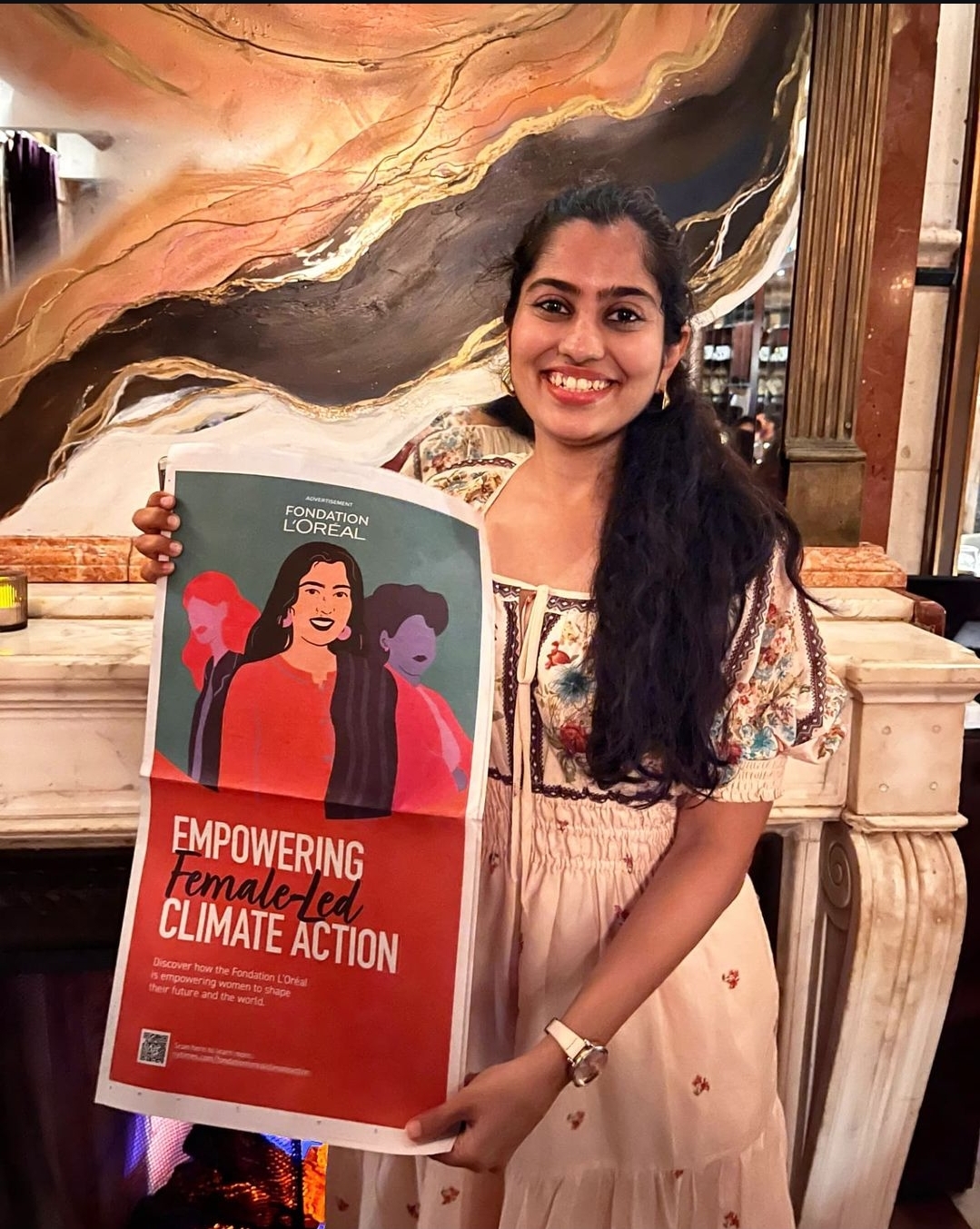
Heeta Lakhani, featured on the cover of The New York Times
Laying the Foundation for Environment
Heeta went on to do her Master’s in environmental studies at TERI University, in Delhi. She recalls, “I was applying for jobs in Mumbai because I wanted to be with my family. At the same time, I was volunteering with a wildlife conservation organisation and studying German. Soon after I completed the course, I got a job as a language expert with TCS, though the environment continued to be my passion. In 2015, there was a lot of buzz in the media about the COP21 [21st Conference of Parties] – a UN Climate Change conference in Paris. Even Prime Minister Modi was going to be there. It is an annual conference held by the UN on climate change. I wanted to go and was looking around for avenues to get there. Luckily, someone I had met while volunteering supported me with a badge to attend the event. I had no training or capacity building for the conference, but I attended it for one week. The entire experience was overwhelming; the venue was spread over one km, and around 30,000 people attended. Even though I didn’t understand the proceedings, I was motivated and it was a sign that I had to go back to working for the environment.”
Due to her volunteer work, the next year, at COP22 held in Morocco, Heeta was part of a youth delegation. She had also joined the UNFCCC youth group for climate change called YOUNGO as a volunteer. “I attended meetings where negotiations on climate change were held. I got to observe the geopolitics involved, the technical language used during the discussions, and the pace and scale of progress.”
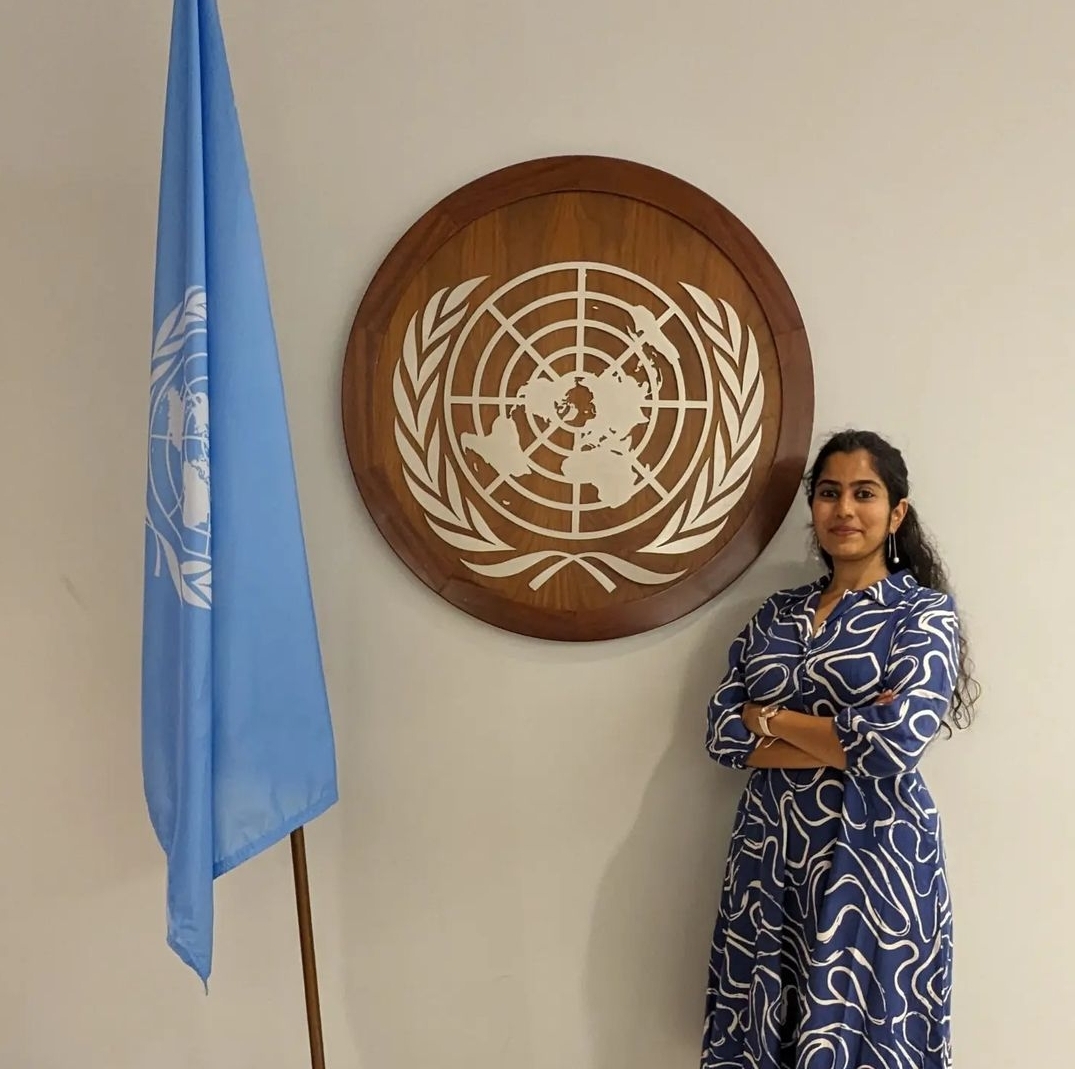
Training them Young
Heeta Lakhani continued volunteering with YOUNGO, a vibrant, global network of children and youth activists associated with the UNFCCC, and did project-based work simultaneously. She contested in the elections for the Global Focal Point of YOUNGO held in 2019, with members from over 170 countries, and won. The role as the head meant she was the primary point of contact for other organisations and the 10,000+ members. Heeta continued to be active in this space and took the learning she gleaned from her interactions towards her next milestone.
She also started the ClimAct Foundation in 2022, of which she is the Founder Director. She reveals, “While working with YOUNGO, I realised that there was a lack of young Indians in this arena. I set up a foundation where I mentor these young changemakers who can combat climate crises with knowledge-based action. We also conduct sessions in private and government schools; and at venues like the Kala Ghoda Art Festival and museums. It is my passion project and I have built it up. It is a not-for-profit organisation and we have grown organically. We are supported entirely through grant funding and are mostly volunteer-based.”
As part of her role, the content for the climate leadership programme that she organises in India over a six-month time frame includes a cohort from across 14 states in India. She says, “The leadership programme involves four months of learning and two months of mentorship and work experience. It includes understanding climate change, biodiversity, ecosystems, climate justice, vulnerability, genders, Indigenous communities, communications, entrepreneurship, etc.”
She has also co-founded the Youth Negotiators Academy, where youth are trained to be effective negotiators in the UN’s intergovernmental processes.
Passion for the Environment
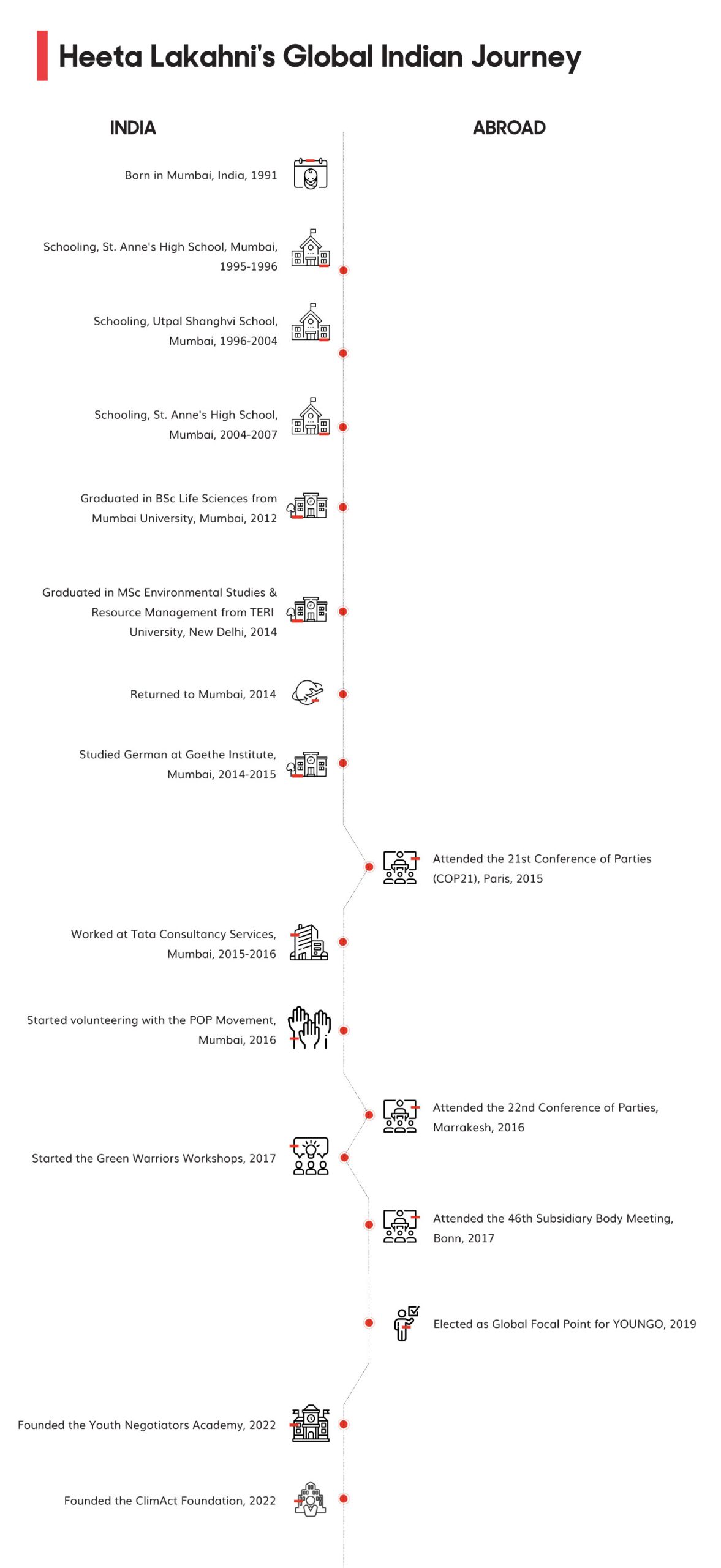
What Heeta Lakhani does requires dedication, passion and commitment. Everyone makes the right noises about saving the environment, but not as many practice it daily. What are the challenges in a country like India for an environmental warrior like Heeta? She says, “Initially, getting an audience was a challenge here. One has to think beyond waste segregation and pollution and look at the bigger picture as well. The next challenge is to bring various audiences together to affect the change. We tweak the messages we send out in the schools and make them relevant and palatable to the audience. We have had sessions with tribal children in Manipur. There, we had to be sensitive to their culture and lifestyle; the content had to be simple so it could be easily translated by a local. The good part however, is that when we started in 2017, we had to explain what climate change means; now everyone already knows about it.”
Another feather in Heeta’s cap is that she is an alumna of the Women Climate Collective and was part of last year’s cohort of 16 women climate leaders. Founded in 2023, Women Climate Collective has worked dedicatedly towards empowering women in the climate and gender equity spaces. This year to further amplify women’s voices in climate action and ensure their equitable participation in designing and implementing sustainable solutions, WCC has launched its next cohort focused on nurturing 20 young women leaders in climate action. These women leaders work across diverse focus areas such as climate advocacy, nature-based solutions, and climate tech, spanning regions from the Himalayas to Bengaluru, and from Maharashtra to West Bengal, as well as many other states and areas of expertise. Heeta was one of the four who attended the Climate Week NYC 2024, from September 22 to 29 in New York. The Collective also facilitates interactions with business leaders, political change-makers, and civil society representatives worldwide to advocate for gender-just climate action.
‘It’s a marathon, not a sprint’
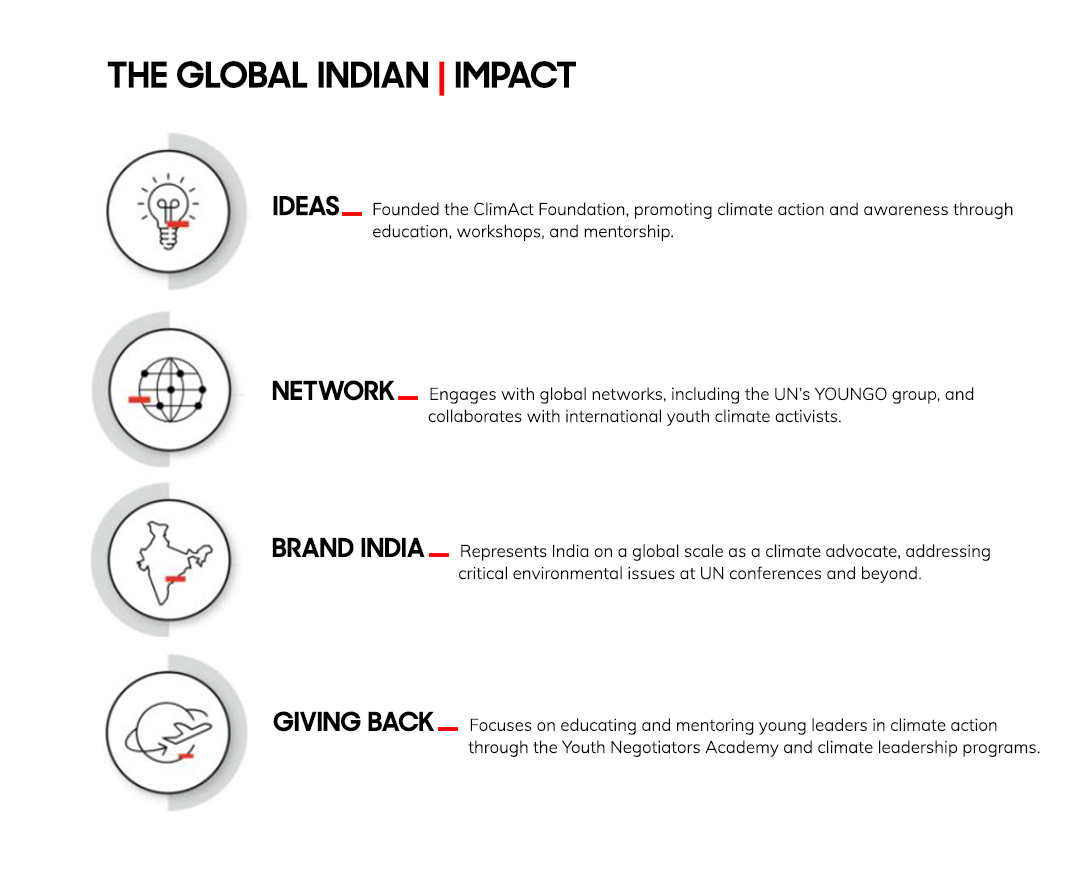
On the personal front, Heeta Lakhani practices what she preaches. She says, “My journey here is a marathon, not a sprint. I am here for the long run.” Her efforts towards saving the environment at home include recycling everything, using menstrual cups, using public transport and trains instead of flights when possible, and travel cutlery. The latter she says “can be a hindrance at airports but I carry my own. I have not bought a bottle of water since I was a teenager and even as kids, we didn’t burst crackers. At home, we have our compost pit and kitchen garden. My parents are also part of all these efforts.”
To conclude, Heeta knows that she has miles to go before her efforts can show sizeable change given all the inherent challenges, but she soldiers on. “We need to rethink our policies and have empathy towards the environment. Whether it is tourism, education, or business, local action at every level is required. The rampant construction in eco-sensitive areas which drives tourists to see a river or a forest destroys what draws them there. Sensitisation of the urban Indian is the need of the hour.”
Read a similar story of Monika Dharia, producing eco-friendly ponchos from sugar.

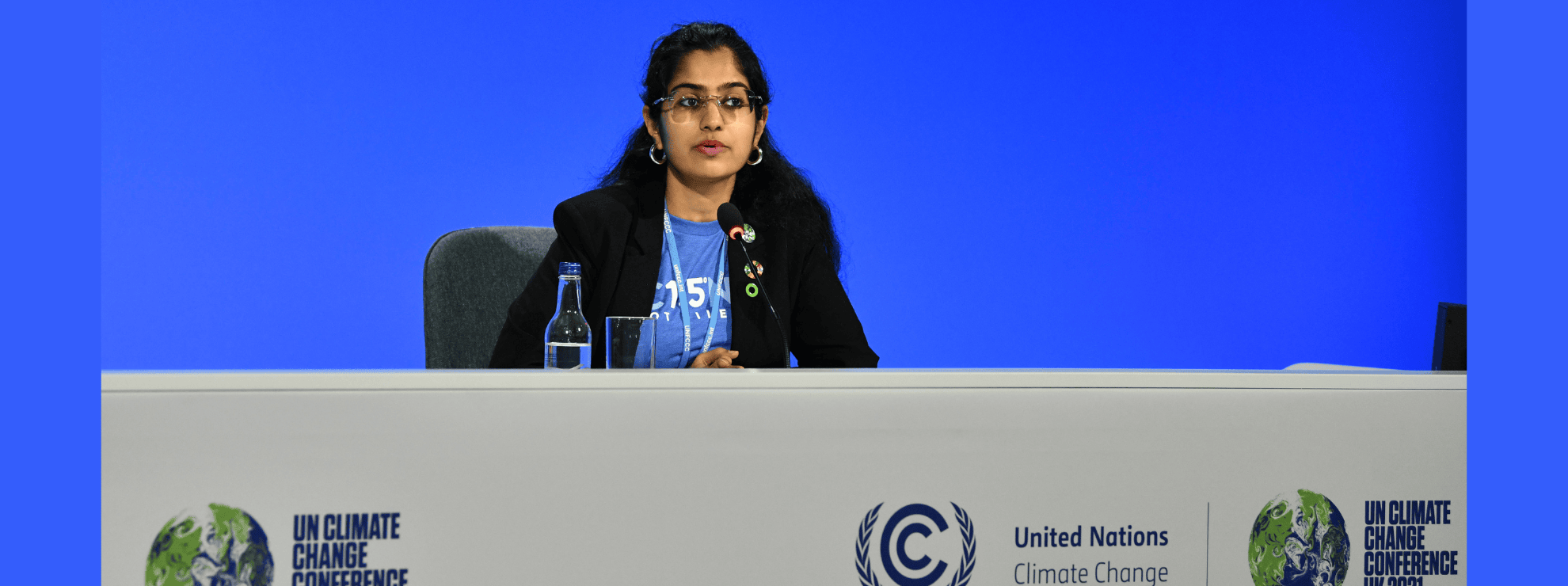




No more as a school girl, glad to know more of her activities, achievements thru the lines. Very proud
Namaste!
Caring for mother Earth is everyone’s responsibility, but a few cherish the burden.
Kudos to the many who have dedicated their lives to the cause for the present and the future.
Earthy Regards!
Dr Tejal and Ashish Mehta